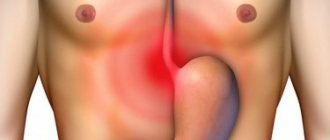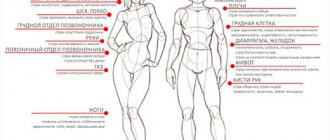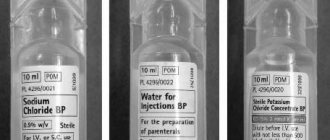Why do you feel discomfort?
Stomach pain is a natural consequence of food intoxication in the body. In fact, any stomach disease is accompanied by painful sensations, and poisoning is no exception. The nature of the pain, depending on the toxic substance, may differ. Sometimes the stomach hurts - “presses”, sometimes it’s sharp colic or aching long-term pain.
In case of poisoning, the pain is localized in both the upper and lower abdomen. This sensation is caused by the attempts of microbacteria in the intestines to process foods and overcome toxins. Nerve receptors are irritated, which is why pain is felt. This is one of the first signs of poisoning. If your stomach suddenly gets sick, you should not neglect this symptom, but it is better to treat it immediately.
This is interesting! The toxins of some microbes are not destroyed during heat treatment, therefore, for safety reasons, it is better to immediately throw away spoiled food products (with a bad smell, weathered, unappetizing in appearance).
Treatment in hospital
Food poisoning of moderate and severe severity, as well as poisoning of any degree in children and pregnant women, intoxication with chemicals is carried out in a hospital setting - under the strict supervision of experienced specialists and with the use of pharmacological agents.
In the hospital, you can conduct a high-quality, comprehensive examination (laboratory tests, instrumental methods - endoscopy, echography, etc.). The doctor, based on the results obtained, will prescribe an individual treatment regimen. Depending on the causative factors of poisoning and its severity, various medications can be used:
- antibiotics - if there is poisoning of an infectious nature;
- sorbents – medicines that absorb and remove toxins from the gastrointestinal tract;
- probiotics – drugs that restore the microflora of the gastrointestinal tract;
- enzymes – improve digestion;
- symptomatic therapy (antispasmodics, antipyretics, etc.).
Infusion therapy (administration of drugs by intravenous drip) is indicated for severe intoxication and dehydration. Various solutions of microelements are prescribed that help the body cope with toxins.
Among the folk methods for poisoning, in order to reduce stomach pain, flaxseed jelly, sea buckthorn oil, chamomile decoction, and aloe juice are used, which are consumed orally. You can resort to alternative medicine recipes only after the approval of the chosen method by your doctor. Self-medication can not only not alleviate the condition, but also aggravate the problem.
How to deal with stomach pain
If sudden pain appears, you should immediately consult a doctor: either go to the clinic or call an ambulance. It is important to establish that this is a consequence of poisoning and not due to another disease. And only after diagnosis can treatment begin.
To relieve sharp spasms while waiting for a doctor, you can take one of the sorbent group medications (activated carbon, Enterosgel, etc.). This can be done almost immediately as soon as there is a suspicion of a problem: sorbents will reduce discomfort, since it does not always seem possible to endure it.
In case of poisoning, most likely, an intestinal lavage with soda solution will be prescribed: this not very pleasant, but very effective procedure will help cleanse the stomach of toxins, which will lead to quick relief of the condition. Children and pregnant women are often hospitalized even with mild signs of malaise - they are under round-the-clock supervision by doctors and are prescribed IVs, which are more likely to restore the balance of microflora in the body.
How to treat pain
The prescription of drugs depends on what exactly caused the poisoning. Most often, treatment will be with the following components:
- sorbents are drugs that remove toxic substances from the body. Enterosgel is taken in this way: 1.5 tbsp. l. or the contents of one sachet are washed down with a glass of water. Take the drug 2 hours before meals or before taking any other medications, the daily norm for children under 5 years is 1.5 tbsp. l. (1 sachet), for children 5-14 years old - 3 tbsp. l. (2 sachets), for children over 14 years old and adults - 4.5 tbsp. l. (3 sachets). Activated carbon is most effective within 12 hours after poisoning; it is taken at the rate of 1 tablet per 10 kg of body weight and is also not recommended to be mixed with food or other medications. Today there are analogues in the pharmacy, for example, “Sorbex” - they are convenient because instead of, for example, 6 tablets, it is enough to take only two;
- antispasmodics - drugs that relieve pain. “No-spa” is one of the most effective antispasmodics; children should take 1 tablet twice a day after meals with water, and adults should take 1-2 tablets, but not more than 6 tablets per day. “Spazmalgon” is taken only after meals, like “No-shpu” - after meals, 1-2 tablets and no more than 6 tablets per day, washed down with plenty of liquid. But analgesics - "Analgin", "Tempalgin" - cannot be used categorically, since they smooth out the symptoms, which makes it difficult to diagnose the condition;
- drinking plenty of water - alkaline, non-carbonated water perfectly restores the water balance in the body, which is disturbed due to diarrhea and vomiting;
- bacteria - to restore the microflora of the body, are used in a course for a long time after there are no visible manifestations of poisoning. "Bifiform" is taken 2 to 4 times a day, one capsule, regardless of meals. For children, Bifiform is produced in powder. Course duration is 2 or 3 weeks. Hilak Forte drops are taken during meals or immediately before meals, diluted in liquid - tea, compote or juice. Children are recommended to take 20-40 drops of Hilak Forte three times a day, adults - 40-60 drops;
- symptomatic prescriptions for headaches, low blood pressure, diarrhea, etc.
There are also traditional methods - if the stomach hurts after poisoning, they help treat it. In first place in popularity is lemon water: squeeze a tablespoon of lemon juice or just a slice of lemon into a glass of warm water and drink 15 minutes before meals. Citric acid cleanses the intestines well, helps remove toxins and feel comfort in the abdominal area.
Cumin seeds also relieve pain: at the first sign of poisoning, crush a tablespoon of seeds in a mortar and pour a glass of warm water, add a teaspoon of salt and drink 2-3 times a day. After several doses of this drink, noticeable relief will come.
Honey is a cure for many diseases. And from this one too. It is recommended to consume 1 tablespoon of honey three times a day - it controls the intensity of acid formation in the stomach and also removes harmful bacteria.
Therapy
If your stomach hurts after poisoning, every person should know what to do. Experts recommend consulting a doctor immediately. At the same time, if the pain is not severe, then it is possible to get rid of the unpleasant sensations on your own. Today there are a huge number of folk methods for treating this type of disease, including raw eggs, liquid oatmeal, and even jellied meat.
These products envelop the stomach, relieve irritation and significantly reduce pain, making recovery much faster.
If pain in the stomach appears after drinking alcohol, you need to give up alcohol in large quantities. The remaining treatment methods will not differ from the usual treatment of food poisoning.
The disappearance of discomfort in the stomach directly depends on proper nutrition. It is recommended to eat light foods that will not cause much harm to the body. In this case, you should exclude fatty, sour foods, various seasonings and fast food from your diet. It is also recommended to process food as little as possible.
It is worth understanding that traditional methods do not work in all cases, so you can figure out how to treat this disease with the help of a medical specialist. If the discomfort does not go away over a long period of time, hospitalization may be required, as well as taking medications that will relieve abdominal pain.
Pain in the stomach area may indicate that toxins have not been removed from the body, so it would be a good idea to take sorbents that will help break down and remove toxic substances from the stomach.
Such medications include Activated Carbon and Smecta, which can be used in strict accordance with the instructions for use. It is important to take into account the individual characteristics of the body and contraindications to taking these drugs. All medications are used only as prescribed by a doctor.
Therapeutic diet for the stomach
In parallel with treatment and after it, a diet will be indicated. It is necessary in order not to overload the pancreas and bring the intestinal microflora in order. Unlike many other diets, the products included in it are chosen not by calorie content or vitamin content, but by ease of absorption by the body.
Thus, the therapeutic diet consists of warm, strong, but not very sweet tea, boiled rice without spices, oatmeal, soft-boiled eggs, crackers from rye and white bread, bananas, apples, fermented milk products (kefir, narine, natural yogurt). The menu seems sparse, but when your stomach hurts, you don’t want to eat much.
You can expand your diet as soon as you feel better. It is worth giving preference to boiled and baked products. It is better to eat in small portions - even if it is 5 or even 6 meals a day, but a little at a time - this will make it easier for the injured stomach to cope with the load.
If your stomach hurts, it is strictly forbidden to eat fatty, spicy, sour, salty and smoked foods, as well as alcohol. This is generally considered an unhealthy diet, and if the microflora is disrupted, such food can only aggravate the condition. Milk is also not allowed, as it can ferment in the stomach. It is also recommended to avoid canned food, butter, sauces, carbonated drinks, snacks and processed foods. However, you shouldn’t eat sweets until you feel better.
After recovery, prohibited foods must be introduced into the diet gradually - it is better to avoid the most harmful foods for at least 2-3 weeks.
But this does not mean at all that after two weeks you can cook fried potatoes with ketchup and pickles for dinner - each product that is prohibited in case of poisoning should be tried in small quantities, carefully listening to your body - monitoring the reaction of the stomach. If you feel the slightest discomfort, you should avoid the product for a while longer.
If you experience stomach pain, the first thing to do is consult a doctor. But do not forget that any medical prescription can be combined with folk recipes and must be combined with the right diet - then recovery will come faster.
source: otravlen.ru
Food poisoning is a health condition caused by eating contaminated food. These are usually bacterial or parasitic pathogens that are carried through unhealthy foods into the human body.
Some common pathogens that cause this condition are salmonella and E. coli. In case of poisoning, complications caused by this condition can be very serious and cause increased weakness in a person, as well as loss of appetite.
Some of the signs of food poisoning include diarrhea, stomach pain, severe vomiting, headaches, fever and weakness.
It is extremely important that a person eats foods that rest the stomach and provide normal nutrition to the body during this illness.
Stomach pain after poisoning is a very common condition. Most adults are familiar with this type of pain, but not everyone knows what the cause of this condition is.
Pain can be associated either directly with the process of poisoning or with any complication that develops after its discovery.
Prevention
It is much easier to exclude possible poisoning than to cope with its consequences. Paying attention to your own nutrition will allow you to rid your life of pain, nausea, vomiting and diarrhea. Then you will be able to lead a completely normal lifestyle without losing your performance and strength. Pay close attention to the following preventive measures:
- When purchasing food in a store, be sure to pay attention to the expiration date. If it has expired or is about to expire, it is not recommended to purchase such a product.
- Be sure to pay attention to the appearance of the product. Mold and severe damage to the appearance indicate that the product is of poor quality.
- Inspect the packaging carefully. If there is damage on it, the product is most likely spoiled.
- It is imperative to comply with the storage and preparation conditions of the dishes - this is the only way you can enjoy the taste without worrying about possible consequences. Some products can only be stored for a certain period of time under special conditions.
Of course, even such measures do not exclude the possibility of food poisoning. Therefore, every person should be prepared for the consequences that the next meal will bring. With the right approach, any disease of this nature is eliminated within a few days, and its consequences do not recur throughout the rest of your life.
A competent, responsible approach to your diet, timely contact with a medical specialist and an immediate response to the symptoms of poisoning will allow each person to enjoy life without harm to health, visit their favorite cafes and restaurants, lead an active lifestyle and maintain efficiency.
Anyone can experience unpleasant symptoms, which is why it is so important to know what danger they pose to a person and how to cope with them.
- Omez after poisoning
- When can you drink alcohol after poisoning?
- Gastric lavage in case of poisoning at home
- Stomach hurts after alcohol what to do
Causes and symptoms
As mentioned above, along with bacteria, viruses and parasites, unintentional consumption of other toxic substances can also lead to food poisoning.
Campylobacter, Salmonella, E. coli, Listeria, Botulism, Bacillus cereus, Staphylococcus, Clostridium, etc. are common types of bacteria that can cause infection.
Botulism occurs due to consumption of foods containing botulin, such as seafood, green beans and beets.
These bacteria are also found in foods such as meat, poultry, dairy products, processed foods, cheese, etc.
Noroviruses, rotaviruses and others are viruses found primarily in seafood and processed foods.
Common parasites that cause infections are protozoa, roundworms and tapeworms. Along with this, microorganisms that are not visible to the naked eye can also lead to poisoning.
Parasites are mainly found in meat, seafood and exotic foods. However, parasitic food poisoning is rare compared to other types of poisoning.
Toxic substances contained in products such as artificial flavors and sweeteners, as well as some exotic products such as certain rare types of mushrooms, barracuda fish, and other seafood can be very harmful.
Pesticides sprayed on fruits and vegetables can also cause an infectious disease and, as a result, food poisoning with the appearance of characteristic stomach pain.
Food poisoning can be caused by the following reasons:
- Eating contaminated food.
- Eating food that is expired, raw, left out in the open for a long time, or not covered with cling film.
- Consumption of dry meat, unwashed fruits and vegetables.
- Consuming processed foods after their expiration dates.
- Eating meat and seafood purchased in unhygienic places (spontaneous markets, etc.).
- Using dirty water for cooking.
When poisoning occurs, some symptoms occur. These will include: nausea, vomiting, headache, diarrhea, stomach pain, weakness, stomach cramps, dehydration.
Mild symptoms can be treated with over-the-counter medications or home remedies.
You can take a certain medicine, for example, an enzyme preparation. A medicine called Pancreatin has also proven itself well (its analogues are Creon and Panzinorm).
Each medicine of this type contains enzymes, they help restore the digestive process after poisoning and produce gastric juice.
Mild to severe poisoning that affects many people at the same time after consuming the same contaminated food is called outbreak poisoning.
Typically there are signs of stomach pain, upset, loss of appetite and other gastrointestinal problems such as nausea, vomiting and diarrhea.
Although fever is often not observed in most cases, some patients do have a high fever. The pain can be either mild or quite intense.
In case of poisoning, symptoms may occur immediately after consuming toxic products or after several days.
For example, eating poisonous mushrooms causes abnormal symptoms for several hours after poisoning.
At the same time, eating foods contaminated with bacteria may only cause noticeable symptoms after quite a long time.
Patients may mistake this condition for stomach flu, which appears solely due to a bacterial or viral infection.
Its symptom, just like after poisoning, is pain of varying intensity and duration.
The mechanism for the development of stomach pain after poisoning is associated with the work of beneficial bacterial microflora in the gastrointestinal tract in the direction of neutralizing a certain toxin that has entered the body.
Painful sensations during poisoning occur in the central part of the abdomen above the navel or to the left of it. When the intestines are involved in the process, symptoms will also be visible in the upper and lower abdomen.
In addition, pain and discomfort in the stomach area during poisoning occur due to the fact that food poisoning provokes the appearance of some chronic disease, which may have previously been in remission.
If the patient had not previously observed problems associated with the gastrointestinal tract, however, they were close to appearing, poisoning probably contributed to their rapid development.
For example, a person could suffer from gastritis even before the moment of poisoning and not realize it, and after an infection, the disease could worsen.
Gastritis is one of the possible complications of food poisoning. Irritating factors that negatively affect and damage the wall of the stomach during intoxication can provoke the appearance of this disease.
Peptic ulcer disease, like gastritis, can be the result of poisoning when the causative factor was too aggressive. Ulcers are characterized by a genetic predisposition.
Poisoning from expired food products in which bacterial infections develop can cause, among other things, gastroenteritis. The development of this disease may be accompanied by diarrhea, nausea, acute pain in the stomach, just like in case of poisoning.
Methods for preventing and preventing pain
One of the main symptoms of food poisoning is dehydration, which usually becomes apparent after the first bout of pain. Dehydration begins because the body often loses most of its water and food through vomiting.
This is why it is important to soothe your stomach by consuming some fruit candies or crackers, which can help relieve discomfort and mild stomach pain after poisoning.
You can drink cold water or juice in small sips, this will prevent an unpleasant aftertaste in your mouth.
The unpleasant taste after poisoning is the result of toxins released by pathogens within the body, as well as the response of the person's immune system as it tries to protect itself from further infection and disease.
It is this bad taste that prevents the appearance of appetite and the ability to eat normally after poisoning.
You can only gradually switch to sweeter drinks such as fresh coconut water, saline and sugar solution with some fresh lemon juice to combat dehydration.
It is advisable to avoid consumption of carbonated drinks. Drinking light, natural drinks instead can help a person feel a little more energized and cheerful.
It is recommended to drink plenty of fresh fruit juices and try to avoid drinks such as coffee as they can dehydrate the body further.
A few hours after the poisoning is detected, you can take small portions of fresh fruits such as bananas, apples, pears or papaya.
You can also try eating boiled rice along with some legumes to help feed your stomach a little.
You can eat light soups. In particular, it is not forbidden to eat chicken soups, because they are not too fatty and even have some medicinal properties.
It is recommended to add fresh herbs to the soup (peppermint or cinnamon) as they greatly help in improving the stomach condition.
It is extremely important to avoid eating heavy foods and fats, as it will be difficult for the stomach to digest them, especially after poisoning. This rule also applies to milk and other dairy products, with the exception of yogurt.
The latter, in fact, is a light and healthy product, especially for those who suffer from indigestion and often feel pain in the abdominal area for this reason.
It is very important not to starve yourself, and even more important in the process of recovery after poisoning is proper nutrition, because the patient must receive the necessary amount of nutrients along with healthy food. That is why you need to include boiled vegetables in your diet.
The only way to avoid worsening your condition after poisoning is to avoid eating in restaurants and small establishments that appear unsanitary.
There is always the opportunity to cook your own food at home. This ensures that meat and other foods are well cooked and not spoiled.
Food poisoning can be avoided by following simple preventive measures.
Firstly , it is important to maintain cleanliness and hygiene to prevent food and drink contamination. The kitchen must be clean, and the person preparing the food must comply with all hygiene standards.
Secondly , raw, undercooked foods should be avoided (especially poultry and other non-vegetable foods). Unused food and leftovers should be thrown away immediately.
Foods that need to be stored for a longer period must be refrigerated, frozen and properly preserved. It is also highly discouraged to eat and drink in unsanitary conditions.
source: jeludokbolit.ru
Painful sensations in the stomach after recent poisoning are a natural phenomenon. It is familiar to anyone familiar with food intoxication. Pain can be a consequence or evidence of the development of complications.
Importance of Dietary Nutrition
Stomach pain after poisoning can be significantly alleviated if you adhere to a thermally, chemically, and mechanically gentle diet. At first, the patient is on “therapeutic fasting.” Then, as you recover, you are allowed to eat light food. The diet is expanded gradually. Products must be of high quality, well processed, steamed or boiled, and well ground before use.
It is recommended to eat in moderate portions, but more often. It is recommended to take large quantities of liquid - mineral water without gas, unsweetened dried fruit compote, rose hips. You can eat slimy porridges, vegetable broths, lean meats, poultry and fish, steamed or boiled. Alcohol, spicy and smoked foods, too salty or sour dishes, milk, fats, fast food, etc. are strictly prohibited. Let's sum it up. Poisoning is accompanied by a number of characteristic unpleasant symptoms, one of which is pain in the epigastrium. Stomach pain can persist for a long time even after an acute period of illness (especially if there has been alcohol poisoning). They may indicate the development of serious gastrointestinal pathologies (ulcers, gastritis, gastroenteritis, neoplasms), and therefore require consultation with a doctor.
The nature of abdominal pain after poisoning
Food poisoning causes stomach pain
Pain sensations can be very different: from dull, which can be tolerated, to sharp and unbearable. Most often, the sufferer complains of pressure and heaviness in the stomach. The attacks appear periodically or do not go away.
Stomach discomfort continues for 3 days after poisoning. This depends on the individual tolerance of the body, the cause of previous intoxication and its likely complications.
Severe pain occurs in case of poisoning with aggressive toxins, including alcoholic beverages.
When should you see a doctor?
When mild, aching pain after food poisoning does not go away within 1-2 days, and there is a tendency for it to intensify, you should consult a doctor. You cannot wait with the help of a qualified doctor when the stomach hurts even slightly after poisoning in children, as well as in women carrying babies.
There is a list of signs that should not be ignored and, if they occur, you should not delay visiting a doctor. We are talking about those cases when, in addition to stomach pain caused by poisoning, a person is worried about:
- muscle pain, respiratory dysfunction;
- the appearance of blood impurities in vomit or feces;
- severe hyperthermia;
- severe malaise;
- intense dehydration, manifested by thirst, dry mucous membranes and skin, convulsions, loss of consciousness.
If, after nutritional poisoning, sharp, unexpected pain in the epigastrium occurs, and the condition rapidly worsens, you should immediately call a doctor - such manifestations may indicate a surgical pathology combined with poisoning, which only an experienced specialist can exclude.
It also happens that stomach pain in a person who has been drinking alcohol for a long time and thereby exposing his body to chronic ethanol poisoning does not go away after the patient has given up alcohol. In such cases, you may suspect the development of dangerous complications (ulcers, tumors), and therefore you should rush to the doctor.
Why does my stomach hurt after poisoning?
Painful sensations arise due to the “restorative” work of beneficial microorganisms in the stomach and intestines. They neutralize the effects of toxins. If there are no other symptoms, for example, vomiting, diarrhea, headache, then the cause may be an exacerbation of chronic gastrointestinal diseases.
Intoxication provokes the development of such diseases, even if there was no such diagnosis before. Poisoning contributes to the rapid development of those diseases that were only “at the gates”. For example, the patient did not know that he was developing gastritis until he was poisoned. Stomach pain accompanies the following diagnoses:
- Gastritis. Negative intoxication factors damage the walls of the stomach, which causes the development of the disease.
- Gastroenteritis. It is provoked by harmful bacteria in stale foods, causing inflammation in the mucous membranes of the intestines and stomach. Diarrhea and nausea are added to abdominal pain.
- Ulcer. If the toxin was very aggressive, then the gastric mucosa is severely affected. As a rule, the previous stage is gastritis.
- Tumor. At the initial stage it does not manifest itself (except for stomach pain). Requires an accurate diagnosis.
Characteristic symptoms
The first signs characterizing poisoning may appear in a person 30 minutes after eating low-quality food. Sometimes negative symptoms make themselves felt after a day.
The following characteristic manifestations indicate food poisoning:
- the occurrence of painful nausea;
- the appearance of repeated vomiting (initially with food eaten, then with gastric juice and finally - ineffective vomiting);
- persistent diarrhea (watery stool contains remnants of undigested food and has a foul odor);
- abdominal pain;
- secretion of saliva in large quantities;
- dizziness, weakness;
- chills, fever.
How long does your stomach hurt after poisoning? On average, unpleasant symptoms persist for 1-3 days. Gradually, the severity of such a clinic subsides, of course, if timely measures are taken to combat the disease.
Stomach pain after alcohol poisoning
With constant consumption of alcohol, ethanol destroys the stomach
Alcohol is not only a poison, but also a strong irritant for the gastrointestinal tract. The walls of the digestive organs absorb ethanol and other toxic elements. In contact with mucous membranes, alcohol acts as a “killer” of not only harmful, but also beneficial microorganisms. But microflora bacteria neutralize toxins.
Isolated cases of alcohol consumption cause targeted “hits” to the gastrointestinal tract, which has time to recover. With chronic use, ethanol fills the stomach, aggressively destroying its walls. The higher the alcohol content in the drink, the more destructive its effect.
Alcohol with a strength of 20% reaches the blood vessels. Therefore, after such poisoning, the sufferer suffers from cutting pain in the stomach. They will torment until the tissue of the walls of the gastrointestinal tract is restored.
If there is a chronic stage of alcoholism, then it comes to ulcers, since the stomach is defenseless due to the constant exposure to alcohol.
Alcohol poisoning and prolonged pain
Symptoms of alcohol poisoning
Alcohol poisoning manifests itself quickly with severe vomiting. In addition to the smell of alcohol, you can smell sour. Vomit contains poorly processed pieces of food, mucus, and bile. With deep destruction of stomach tissue, blood vessels are damaged and blood clots may occur. The liver enlarges, unable to cope with the increased load, and pressure and pain begin in the right side under the ribs.
Alkaloids, entering the stomach in large quantities, kill beneficial bacteria and cause burns to the internal surfaces of not only the stomach, but the esophagus and intestines. The most severe consequences of stomach poisoning and pain are after drinking drinks containing ethyl alcohol. The stomach hurts after alcohol poisoning for a long time and requires adherence to a diet and treatment with medications and folk remedies.
The process of getting rid of pain begins with the restoration of a colony of beneficial bacteria, which are responsible in the stomach and intestines for removing toxins and waste. Alcohol kills them first, complicating the process of intoxication and cleansing the body. Once in the stomach, alcohol causes increased secretion of hydrochloric acid. Alcohol enhances the aggressive effect of gastric juice on the mucous membrane, destroying it. The folds on the inner walls become inflamed, causing severe pain.
Alcohol poisoning can have serious consequences. Strong drinks are especially dangerous. With frequent use, they kill microflora, burn the walls, causing gastritis. Attempts to protect the stomach from the effects of alcohol with fatty foods worsen the condition of the organ. Overeating before bed, difficult-to-process fats and alkaloids cause swelling of the stomach tissue.
X-ray examination shows that the folds inside swell and increase in size. Doctors called this phenomenon “banquet stomach.” A similar inflammation occurs mainly with frequent heavy dinners with the consumption of vodka and cognac. Burns develop into chronic gastritis with a high risk of developing a malignant tumor. Symptoms of exacerbation after alcohol poisoning:
- The stomach constantly reminds itself of itself with aching pain, heartburn and bowel dysfunction.
- Weakness appears, the skin becomes pale, anemia develops.
- A weakened immune system leads to frequent colds and viral diseases.
Drinking another portion of alcohol paralyzes nerve endings, creating a false impression of relief and pain relief. As a result, the condition worsens.
In what cases should you seek medical help?
After the causes of poisoning have been clarified, but the pain has not gone away, and other symptoms have been added to them, you should seek medical help. Warning signs include:
- dehydration;
- fever, fever;
- weakness and malaise;
- diarrhea (with blood);
- nausea and vomiting (with blood);
- labored breathing;
- muscle weakness.
If these symptoms are observed in young children and pregnant women, you should immediately call an ambulance.
You need to visit a doctor, even if the signs of intoxication have passed and the pain has gone away. The specialist will check for complications after poisoning and give recommendations for restoring the gastrointestinal tract.
Treatment with medications
If, after poisoning, damage to the digestive system is not accompanied by pronounced pathological changes in the gastric mucosa, then restoration of function with maintenance treatment occurs quickly.
More severe gastrointestinal lesions require complex and longer treatment with dynamic monitoring by a gastroenterologist to restore the function of the body’s digestive system. Complex therapy of pain syndrome with restoration of the gastrointestinal tract includes the following medications:
- drug treatment - drugs are prescribed that relieve spasm of the smooth muscles of the stomach and are used for pain of mild or moderate severity - Papazol, Drotaverine, No-Shpa, Iberogast;
- enveloping drugs for more active restoration of damaged gastric mucosa - Almagel, Phosphalugel, Maalox, Sucralfate;
- to improve the secretory function of the stomach - Festal, Pancreatin, Mezim forte;
- to restore the microflora of the stomach and intestines, which, as a rule, suffers from poisoning - Linex, Bifiform, Lactobacterin;
- to stimulate gastric peristalsis - Motilium, Motilak, Passazhiks.
After pain relief in case of poisoning, drug treatment is supplemented with physiotherapeutic procedures:
- magnetic therapy;
- electrophoresis on the upper abdomen with medications, No-Spa or Novocaine;
- DMV – therapy;
- water treatments in the form of hydromassage, mineral baths.
This combination of medication and physiotherapeutic treatment helps relieve pain, improve gastric motility, and increase the regenerative function of the gastrointestinal tract.
The presence of pain in the stomach requires mandatory consultation and examination with a gastroenterologist to determine the cause of the pain syndrome and exclude complications after poisoning.
How to deal with stomach pain
Activated carbon will help relieve intoxication
If you take your health responsibly, then first you need to go to the hospital to find out the cause of the pain. Only after finding out the exact diagnosis should you begin treatment.
Before the doctors arrive, you can take a sorbent drug (activated carbon, etc.) to relieve spasms. At the first suspicion of poisoning, take these medications, they will reduce discomfort.
The arriving doctor will conduct an examination and, in case of poisoning, prescribe intestinal lavage with soda. The procedure is not a pleasant procedure, but it is effective. It will cleanse the stomach of toxins and normalize the general condition.
Children and women in delicate situations are immediately hospitalized for round-the-clock observation. They are given IVs that quickly restore the microflora.
First aid
You can treat food intoxication at home if the degree of damage is minor. When, after vomiting, the stomach hurts, the secretion of saliva increases, convulsions develop, and an emergency room must be called. Even with mild illness, medical therapy is necessary for the child.
Women need to be careful about food during pregnancy. Stomach cramps during poisoning provoke increased uterine tone, which causes miscarriages and early birth. Toxins present in the ingredients and produced by bacteria easily cross the placenta and affect the development of the fetus.
To reduce symptoms, it is recommended to use the following procedures at home:
- Rinse the stomach with a solution of baking soda or salt. If for some reason there is no vomiting, it is induced artificially by placing 2 fingers on the root of the tongue. Such a simple manipulation will remove the remains of undigested food from the gastrointestinal tract and alleviate the condition of the victim.
- Drink more fluids, as the risks of dehydration are high.
- It is not advisable to anesthetize spasms - this smoothes out the symptoms of illness and it will be more difficult for doctors to identify the cause of the pathology. But it is allowed to take antispasmodics, for example, No-shpu.
- Food particles penetrate the intestines, where they are absorbed into the blood and distributed to other organs. To bind and eliminate them along with feces, it is recommended to take sorbents. Activated and White carbon, Polysorb, Enterosgel are popular.
Much depends on the characteristics of the substance that caused the poisoning. For example, when damaged by alkalis, the negative effects of acids are neutralized. But you should not resort to such procedures on your own, since the risks of secondary burns of the esophagus and stomach are high.
How to deal with stomach pain after poisoning
Traditional recipes will help relieve stomach pain after poisoning. For this purpose, such miracle products as liquid oatmeal porridge, jellied meat, and raw eggs are suitable. They envelop the walls of the stomach, soothing irritation. Aloe juice, chamomile decoction, and sea buckthorn oil will reduce pain. If poisoning is caused by alcohol, then it should be excluded for some time.
After poisoning, you need to eat honey - 1 large spoon three times a day. This natural product regulates the formation of stomach acid and fights harmful microorganisms.
How to treat pain
Drug treatment depends on the cause of poisoning. The most commonly prescribed drugs are:
- bacteria to restore damaged flora (taken in a course);
- auxiliary drugs (against headaches, high blood pressure and diarrhea);
- antispasmodics against pain (“No-spa”, etc.);
- sorbents for removing toxins (Enterosgel, activated carbon, etc.).
Under no circumstances should you take analgesics (Analgin, etc.), as they interfere with diagnosis by smoothing out symptoms.
The patient is also advised to drink plenty of fluids to restore fluid balance. Non-carbonated alkaline water is suitable for this.











